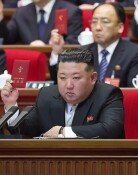[Editorial] President Should Speak Up Towards N. Korea
[Editorial] President Should Speak Up Towards N. Korea
Posted October. 06, 2007 05:39,
Visiting Gaesong Industrial Complex as the last scheduled meeting of the summit talks on October 4, President Roh said, This industrial complex is where we, the two Koreas, unite and prosper. This is not the place we push the North to reform and open. Those matters should be determined by the North Korean government itself. He added, I made up my mind that when I return to Seoul, the administration would not make such remarks.
If President Roh does not intend to shift its policy towards North Korea, his remark is a grave slip of the tongue, for which he must give a clear explanation. Prior to this, he also said, Chairman Kim Jong Il is showing disapproval towards opening the nation, during his stay in Pyongyang.
The current administrations policy on North Korea, which stands for Peace and Prosperity policy, inherited the Sunshine Policy of the Kim Dae-jung government. The basis of the logic of the policy is premised on an assumption that if the North receives help, it would lead the communist country to voluntarily undergo reformation, just as the sun beats down on the traveler and makes him take off his clothes, as conveyed in Aesops fable. Under such a premise, the administration has provided the North with an astronomical amount of aid for the last decade.
As if that werent enough, the president pledged numerous economic assistances to the North during the summit talks. However, it failed to have raised North Koreas renovation and reformation, which are our ultimate major concerns. In this context, we cannot help but ask a question as to what the administrations policys fundamental goal is. Does it want to continue wasting taxpayers money while remaining silent about Norths reform?
The presidents remarks may be interpreted as saying that we have to make strategic progress in cooperation with Pyongyang, instead of provoking the North. However, taking such reasoning into consideration, President Rohs public remarks should have been more prudent. His words could have unintentionally been interpreted such that he would avoid controversy.
The president has failed to raise the human rights issue of the North during the inter-Korean summit talks. He apologized for not reaching consensus for returns of the abductees and POWs. These issues include matters that the North Korean leader is averse to.
The second clause of the joint agreement, which stipulates nonintervention on domestic matters and establishment of the legal and institutional mechanisms for unification, is nothing but a guarantee not to disturb the North Korean leader, as well as the abolishment of the National Security Law. We want to ask, When does the administration think it can make some practical measures that can reap benefits from its North Korean policy? If the trend continues, the administration will only have to face citizens turning their backs on aid towards the North.







